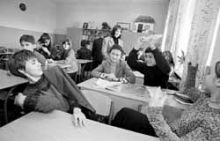Many psychologists claim that an inclination to idolization is a characteristic of children. Both junior schoolchildren and teenagers often create themselves idols and try to imitate them, copying their way of behaving, dressing, and talking. Such childish idolization is natural, unlike the images of their idols. Often they are formed not within the child’s consciousness, but from the outside, in the collective consciousness of the micro-community he is surrounded by. The child just adopts the ready-made images with the conformity inherent in childhood. A few decades ago heroes, like everything else, were, so to speak, nationwide, which was explained by a forced lack of dissent, even among children. Today there are also a number of factors having an influence on the child’s mind. The most powerful among them are the mass media, especially television, and coevals’ stereotyped opinions. In the view of older generations, modern youth is incapable of striving for high ideals and recognizing true heroes (this view was first documented in the writings of old- timers of Ancient Egypt and has been consistently repeated ever since — Ed.). To prove or refute this assumption and reveal to some of the existing real tendencies for idolization within childhood society, The Day’s correspondent went to Kyiv schools to ask the question to junior and senior pupils, Whom do you believe your hero, your idol whose example you follow?
It became clear from the answers given by ninety second, seventh, and tenth graders of Kyiv schools No. 92 and 169 that infantile ideals undergo significant transformation with time. The heroes of the youngest are almost in equal measure their mothers, fathers, brothers, sisters, or schoolteachers (eleven replies) or television stars (thirteen replies). Six other children, mostly girls, believe fairy tale characters to be their idols. For children in their early teens, as a rule, there is a tendency of declining parental significance, along with increasing prestige of their coevals and celebrities. Only nine out of thirty-four seventh graders named their relatives among their heroes; others believe pop and film stars to be fitting models for imitation (Claudia Schiffer, Natalia Oreiro, Arnold Schwarzenegger, Russian pop singer Alsu, or even Japan’s animated Pokemons). With older pupils situation is more complicated: their attitude toward idols is determined primarily by the success they have achieved. Wanting to obtain much in the future, older schoolchildren despise losers and put on pedestal those who already enjoy fame, even if of an ill nature. Many boys, for instance, called Bill Gates their hero. Some children, the most advanced ones, dream and strive to be like renowned politicians (e.g. Tony Blair or Kofi Annan; we must note that there appeared to be no Ukrainians in the list). Even teens whose idols are their own parents explained this in terms of their success.
It is difficult to make any unambiguous conclusions regarding the new generation’s ideals: each such child comes through his/her own process of growing up, each is surrounded by a special environment, and each obtains individual psychological characteristics. However, by all indications, we are not threatened by the total de-idealization of society that is recently so widely discussed. It is especially easy to believe when you meet with rare cases of true understanding of heroism among the young, like this tenth-year pupil who wrote, “A true hero is my father who supports our whole family in spite of being blind...”
VERBATIM
Roman KULISH, seventh grader:
For me my older brother is a hero. He never offends people, always trying to sort things out calmly and peacefully. This brings certain results. I want to be like him, trying to understand people, help them, and solve my own problems without harm to others.
Anhelyna KARIAKINA, eleventh grader:
There are two types of people. Some just push their way through, trying to get what they want at any price, stopping at nothing. But when they achieve this goal, they have no true friends left, nobody to trust. The second type is those who sacrifice their own goals to preserve their human traits: kindness, honesty, etc. My idol is a person combining traits characteristic of both types. A person who can get what he/she wants and stay human. This is hard, but this is what I would be like.
Oleksandra ZAVERTAILO, second grader:
I would like to be like my sister. Her grades are better than mine, and I would like to be as good a pupil as she is. I always follow her example. She helps me a lot. When I am in the seventh grade like she is now, I’ll be exactly like her.
Oleksiy POPOV, eleventh grader: I am my own hero. I would like just to be myself, because I like myself exactly the way I am now. I am not planning to make any cardinal changes in myself. I think it would be immodest to specify my own “heroic” qualities, so let my friends talk about it.
Kateryna ILLYNA, ninth grader:
I believe a person should always be open and always be him/herself. In our days many try to pretend to be something else, and there are only few people who are not afraid of themselves. I deeply respect such people and consider them true heroes. I have a friend like this. I think he is my hero and my idol. I try to take him as my model.







